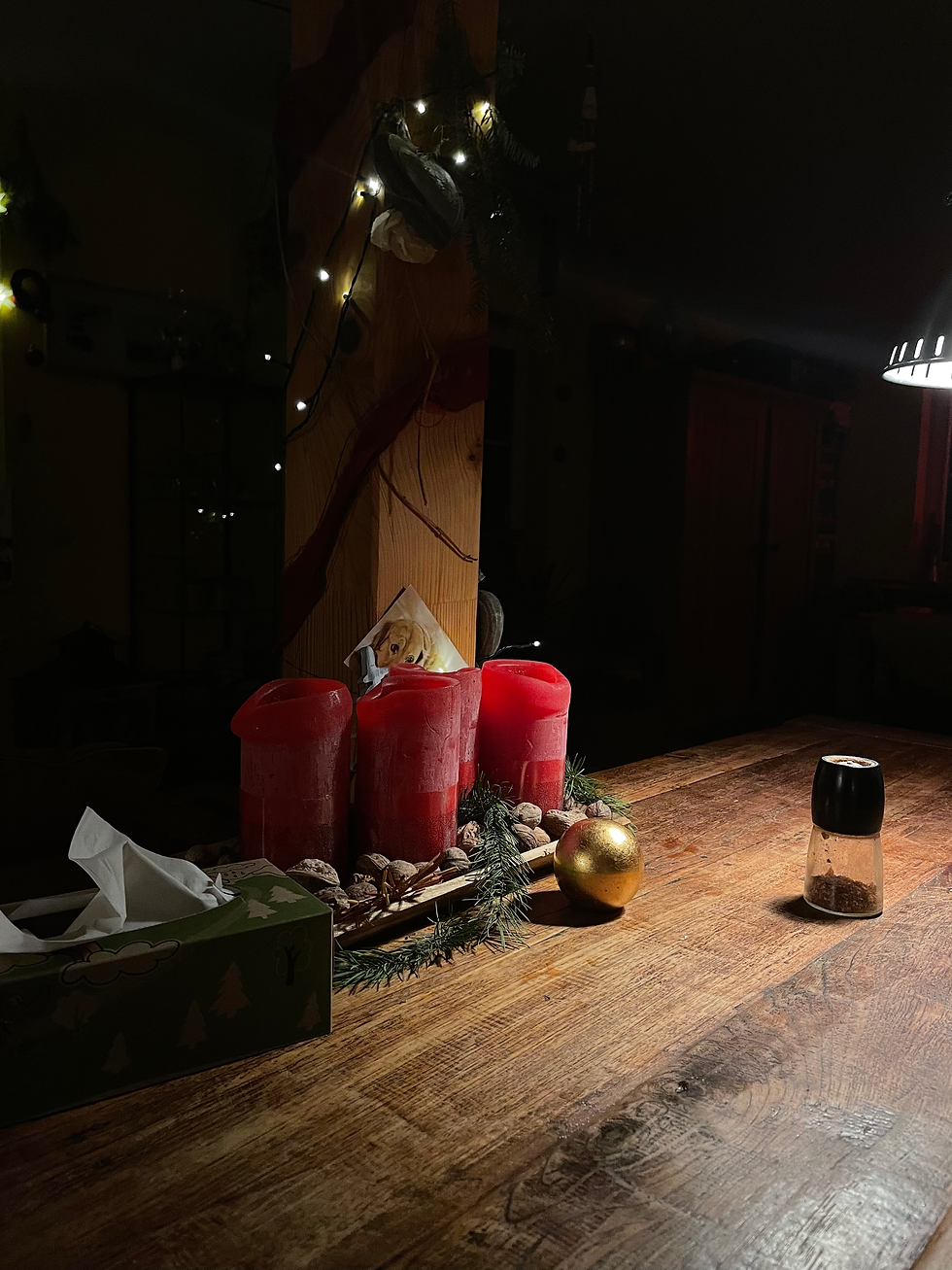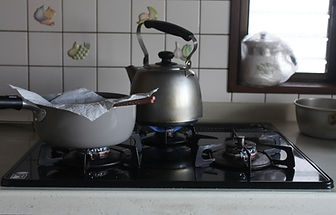32. 日曜日の食卓、移民大国ドイツとナチスのお話/In Sunday Lunch, An Indelible Nazi History
- Kyoko
- 2022年12月24日
- 読了時間: 8分
日曜日の朝7時。
太陽はまだ登らず真っ暗な朝、暖炉の中で音を立て始めた火を囲みながら、Kathlinさんと温かいコーヒーを飲む。薪が燃える音のみが聞こえ、静寂に包まれたリビングで、Kathlinさんはゆっくりと話す。
Sunday morning, 7am.
The sun had not yet risen and it was pitch-dark in the morning, and Kathlin and I had a hot cup of coffee, sitting in front of the fire. In the quiet living room, where only the sound of burning wood can be heard, Kathlin speaks slowly.

Kathlinさんのおばあさんが若かった頃。
体育の教師になることを夢見ていたおばあさんだったが、料理や家事を学んで立派な母親になるべきだという考えが一般的だった時代。スポーツをすることも、体育の教師になることも、女性たちにとっては叶わぬ夢だった。
It was the story when Kathlin's grandmother was young.
Her grandmother dreamt of becoming a physical education teacher, but it was a time when the prevailing belief was that she should learn to cook and do housework and become a good mother. Playing sports and becoming a PE teacher were unfulfilled dreams for women.
そんな時代に「女性も外に出てスポーツをすべきだ。」と説いた1人の男がいた。スポーツが大好きだったおばあさんにとって、その男の言葉は、社会が望む「女性像」から自分を解放する言葉のように聞こえたそうだ。
At such a difficult time for women, one man said that "women should go out and play sports like men." To the grandmother, who loved sports, his words sounded like words that would free her from the 'female image' that society wanted her to be.
その男はヒトラーだった。
That man was Hitler.
ある日、おばあさんは友人からこんなことを言われたそうだ。
「君が尊敬するあの男が何をしたか知っているかい?ユダヤ人を大量虐殺したんだ。女性も子どもも関係なく。」
おばあさんは友人の言葉を信じることができなかった。
自分を「女性像」から解放してくれたヒトラーがそんな無惨なことをするわけがない、と。
One day, the grandmother was told by a friend.
''Do you know what that man you admire so much did? He massacred the Jews, even women and children.''
The grandmother could not believe her friend's words.
She thought that Hitler, who had freed her from her 'woman image', could not have done such a cruel thing.
時は流れ、終戦を迎えた時。
その時初めて、おばあさんはヒトラーがユダヤ人にしたことを知り、「自分は完全に間違っていた」と思ったそうだ。
Time passed and the war came to an end.
Only then did the grandmother realize what Hitler had done to the Jews and she felt that she had been completely wrong.
「ドイツの人々の多くはね、たとえそれが過去の出来事であっても、ナチスドイツの歴史にとても責任を感じているの。」
''Many Germans feel very responsible for the history of Nazi Germany, even if it is in the past.''
・
・
・
太陽は登り、穏やかに晴れた。
今日は、Kathlinさんのご両親・ IrisさんとPeterさんと一緒に、日曜日の特別な料理をする。
The sun rose and it was sunny.
We were going to cooking a special Sunday meal with Kathlin's parents Iris and Peter.

お肉はオーブンで最低2時間焼く必要があるということで、ご両親の家に到着した時にはすでにオーブンの中にいた。牛肉を焼くのに使われているのはローマ時代に伝わった土器で、この中に香味野菜と牛肉を入れて、じっくりと火を通していく。
The meat needed to be baked in the oven for at least two hours, so it was already in the oven when we arrived at the parents' house. The earthenware used to cook the beef is called 'Roman'. As the name suggests, these earthenware vessels were introduced in Roman times, and the beef is placed in these vessels with the aromatic vegetables and cooked slowly.
その間に、お肉の付け合わせを作っていく。
Meanwhile, prepare the meat accompaniments.
じゃがいもは小さく切って茹でる。
Cut potatoes into a small and boil them.

紫キャベツは千切りにして、すりおろしたりんご、砂糖、ローリエ、塩胡椒、ホールスパイス、お酢を煮込んでいく。この紫キャベツの煮込みはRotkohl mit Äpfelnと呼ばれるもので、Rotkohl紫キャベツ と Äpfelnりんごを使った、冬のドイツの定番料理の一つ。
Cut the red cabbage and stewed with grated apple, sugar, bay leaves, salt and pepper, whole spices and vinegar. This dish is called ''Rotkohl mit Äpfeln,'' one of the classic German winter dishes. 'Rotkohl' means purple cabbage and 'Äpfeln' means apples.

野菜の準備をしていると、IrisさんとPeterさんの孫・Neleが帰ってきた。ハノーファーの大学で獣医学の勉強をしている彼女。1ヶ月ぶりに帰ってきたというNeleに、IrisおばあちゃんもPeterおじいちゃんも嬉しそう。
While preparing the vegetables, their granddaughter Nele came home. She is studying veterinary medicine at university in Hanover. They are happy to see Nele, who has not been home for a month.
帰ってきたNeleも参加して、引き続き野菜を準備していく。
Now, Nele joined us and we kept preparing meal.

お肉を焼き始めて約2時間が経過したところで、オーブンから取り出す。
After about two hours of cooking the meat, take it out of the oven.

最後に、こんがり焼いた後に砂糖でキャラメリゼしたタマネギと、お肉と一緒に焼いた香味野菜、肉汁をミキサーにかけてソースを作る。
The onions caramelised with sugar, the savoury vegetables baked with the meat and the meat juices were mixed in a blender to make a sauce.
食事が完成したタイミングで、Peterおじいちゃんが台所にやってきた。
次は、Peterおじいちゃんとデザートの用意。
「料理上手の娘が送ってくれたレシピで、ダッチベイビーを作るよ!」おじいちゃんはとても嬉しそう。
Just as the meal was finished, Peter came into the kitchen.
Next, Grandpa and I prepared dessert.
'I'm going to make Dutch baby with a recipe my daughter, who is a great cook, sent me!' Grandpa looks very happy.
Peterおじいちゃんの大きくて分厚い手で、小さなりんごの皮を剥いて切る。
Peter's big, thick hands peeled and cut the little apples.

りんごをバターで炒めたら、小麦粉・砂糖・卵・レーズンと一緒に混ぜ合わせる。
After frying the apples in butter, he mixed them together with flour, sugar, eggs and raisins.

今度はおじいちゃんの大きな手でバターを丸ごと掴み、ケーキの焼き型に豪快に塗っていく。そこに、ケーキの生地を流し込んだらオーブンに入れて焼いていく。
Grandpa's big, thick hands grabbed the whole butter and spread to the cake baking mould. Pour the dough into it and put in the oven and bake.
午後1時すぎ。
温かい太陽の光が当たる食卓で、スープに、お肉に。
ゆっくり味わいながら、お話をしながら、食事を楽しむ。
Around 1pm, the meal was ready after long time preparation.
In the warm sunshine at the table, we ate soup, meat and dessert while enjoying chatting.

食後、ダッチベイビーがタイミング良く焼き上がる。
コーヒーを片手に、Peterおじいちゃんが話を始めた。
「ドイツはね、たくさんの国の影響を受けているんだよ。実は9つの国と国境を接しているんだ。」
Over a cup of coffee with Dutch baby, Peter started to talk.
''Germany, you know, is influenced by a lot of countries. In fact, it borders nine countries."

え?9か国も?と私が驚くと、「昔、飛行機で隣に座ったアメリカ人に同じ話をしたら、全く同じ反応をしていたよ」とPeterおじいちゃんが笑った。
よくよく地図を見返すと、確かに本当に9つの国と接している。
Nine countries? I said surprisingly.
'' I told the same story to an American who used to sit next to me on the plane and he had exactly the same reaction like you", the grandpa laughed.
If you look back at the map carefully, Germany is surrounded by nine countries.

多くの国と陸続きであるドイツは移民大国で、2019年時点でドイツの全人口における移民の割合は16.1%。 Being land-locked with various countries, Germany is a major immigration country, and as of 2019 the proportion of immigrants in the total German population was 16.1%.
参考文献:OECD ''Foreign-born population'' https://data.oecd.org/migration/foreign-born-population.htm
パーセンテージだけ見ると上位10位とそこまで高くないようにも聞こえるが、難民・EU市民以外の「非EU市民」の受け入れという点において、ドイツの移民政策は優れていると言われている。「非EU市民」は、大学卒業相当の学位または一定の職業資格を持っていれば、ドイツ人労働者と同等の待遇を受けることができるのだ。
Although the percentage alone may not sound that high, Germany's immigration policy is said to be excellent in that Germany accept 'Non-EU citizens.' 'Non-EU citizens' who are neither refugees nor EU citizens are entitled to the same treatment as German workers if they have a degree equivalent to a university degree or certain professional qualifications.
参考文献:山田久「ドイツ・スウェーデンの外国人政策から何を学ぶか ~熟練労働者を市民として受入れる~」『Viewpoint <山田久の視点>』日本総研 2019 年7月4日 No.2019-018 https://www.jri.co.jp/MediaLibrary/file/report/viewpoint/pdf/11198.pdf
「ドイツは本当にたくさんの国の影響を受けていて、色々な国の文化が混ざっているんだよ。」Peterおじいちゃんがそう教えてくれた。
''Germany is really influenced by so many countries, it's a mixture of different national cultures.'' Grandpa Peter told me this.
・
・
・
その日の夜、キャンドルの灯の中でMarkさんと話していた。
At that night, I was talking to Mark in the candle light.
私がドイツに来て驚いたこと、ヨーロッパに来て驚いたことは、私の想像以上に多様な人種がいたということだった。世界を知らない、井の中の蛙だった私は、てっきりヨーロッパには人種の多様性はないと思っていたのだ。
What surprised me when I came to Europe, was that there was a more diversity of races than I had imagined. I had always thought there was no racial diversity in Europe, as I was a frog in a well, unaware of the world.
こんな私の呟きに、Markさんはこう返した。
「ドイツの人々は、ナチスドイツの歴史があるからこそ、移民の受け入れに寛容なんじゃないかな。もちろん、賛成の人も反対の人もいるけれど。でも、僕は、移民がたくさんいるからこそ今のドイツ社会が成立していると思うし、様々な文化が入ってきて面白くなっていると思うな。」
Mark responded to what I muttered.
''I think the German people are more tolerant of immigration because of the history of Nazi Germany. Of course, there are people who are for it and people who are against it. But I think today's German society is helped by many immigrants, and I think it's interesting that so many different cultures have come in."















コメント